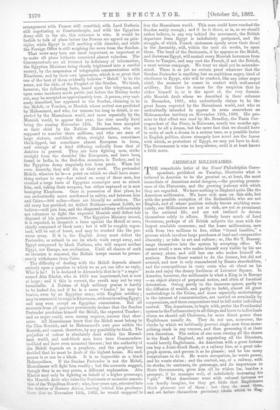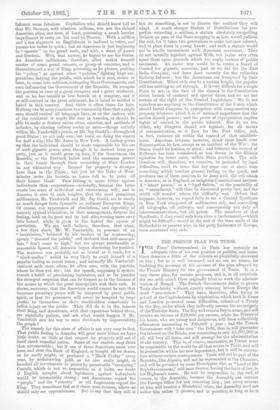AMERICAN MILLIONAIRES.
THE remarkable letter of the Times' Philadelphia Corre- spondent, published on Tuesday, illustrates what is believed in America to be the greatest or, at least, the most immediate of American social dangers,—the growing promin- ence of the Plutocrats, and the growing jealousy with which they are regarded. We have nothing in England quite like the American millionaire. We have rich men on this aide, but with the possible exception of the Rothschilds, who are not English, and of whose position nobody knows anything accu- rately, our Millionaires are not so rich, are not so prominent in the national life, and are not inclined to devote themselves solely to affairs. Nobody hears much of Lord Overstone, perhaps of all British subjects the man with the largest available resources ; and the lesser millionaires, men with from two millions to five, either "found families," a process which involves large purchases of land and comparative obscurity ; or take to art and culture ; or, like Sir T. Brassey, range themselves into the system by accepting office. We cannot recall a man who makes himself very visible by his use of money, alone, and still less one who makes himself ob- noxious. Baron Grant wanted to do the former,, but did not succeed, and now is only remembered by Emma shareholders, and the cosmopolitans in rusty coats who sit about on his seats and enjoy the dreary liveliness of Leicester Square. In America, however, the millionaire is what a King is in Europe —an object always of perpetual notice, and often of fanatical detestation. Owing partly to the immense spaces, partly to the diffusion of wealth, and partly to habit, almost all great undertakings in the Union, and more especially undertakings in the interest of communication, are carried on nominally by corporations, and these corporations tend to fall under individual control. The Americans, to begin with, prefer the Presidential system to the Parliamentary in all things, and leave to individuals whom we should call Chairmen, far more direct power than Englishmen usually do. They do not use, moreover, the checks by which we habitually prevent single men from mono- polising stock in any concern, and then governing it at their own discretion. The notion of one man owning all the shares in the Bank of England, and appointing all the Directors, would horrify Englishmen. An American with a great fortune can buy a Joint-Stock Bank, or a railway line, or a great tele- graph system, and govern it as he pleases ; and he has many temptations te do it. He wants occupation, he wants power, and he wants status ; and the control, say, of a railway, with its stocks, its contracts, its patronage and its importance to State Governments, gives him all he wishes for, besides a prospect, if he manages well, of indefinitely increasing his "pile." What Americans want with colossal fortunes we can hardly imagine, for they get little that Englishmen think pleasant out of them ; but they do want them, and set before .themselves pecuniary ideals which to Eng-
Hahn:ten seem fabulous. Capitalists who should know tell us that Mr. Stewart, with nineteen millions, was not the richest American alive, one man, at least, possessing a much heavier impediment to carry on his road to Heaven. With a million. and a few sixpences an Englishman is inclined to retire, and pursue his tastes in quiet ; but an American is just beginning to " operate " on the grand scale, and with a sense of power and freedom. With that money, he begins to use his brains. An American millionaire, therefore, often makes himself master of some grand concern, or group of concerns, and is thenceforward a sort of King, governing as he pleases, pushing his " policy " as against other "policies," fighting huge cor- porations, defying the public, with which he is sure, sooner or later, to come into collision, corrupting State Governments, and even influencing the Government of the Republic. He occupies the position at once of a great company and a great aristocrat, and as he has usually as few bowels as a company, and is as self-centred as the great aristocrat, he is hated as neither is hated in this country. And there is often cause for hate. Nothing can be more vexatious to a community than that a single man should control all telegraph lines, as on the eastern side of the continent is nearly the case in America, or should be ' able to make or destroy entire cities, counties, and methods of industry, by altering railway routes or rates—things entirely within Mr. Vanderbilt's power, or Mr. Jay Gould's—throughout great States ; or not only own, but insist on doing the repairs for half a city, like Mr. Astor in New York. A feeling grows up that the individual should be made responsible for the use of such gigantic power, even though it be derived from pro- perty, just as it would grow up here, if the Grosvenors, the Russells, or the Bentinck ladies used the enormous powers in their hands through their ownership of West London in any whimsical way. Respect for property is stronger here than in the Union ; but just let the Duke of West- minster order his tenants, as leases fall in, to paint all their houses black. This feeling is more bitter against individuals than corporations—naturally, because the latter create less sense of individual and unreasoning will ; and in America it rises to such heights, that the most prominent millionaires, Mr. Vanderbilt and Mr. Jay Gould, are in nearly as much danger froth dynamite as ordinary European Kings. Of course, any appearance of absolutism, and especially of coarsely cynical absolutism, in their management, deepens the feeling, both on its good and its bad side, rousing mere envy into hatred, while it gives to the hatred the excuse of
patriotism. We can well believe, therefore, that when, a few days since, Mr. W. Vanderbilt, in presence of an "interviewer," believed by his readers to be trustworthy, openly "damned the public," and declared that anti-monopo- lists "don't come so high," but are always purchasable at reasonable figures, all America began discussing his position. The sentence was probably not so brutal as it reads, for a " black-mailer " would be very likely to avail himself of a popular feeling to extort terms ; and naturally Mr. Vanberbilt confuses such men, whom he often sees, with the patriots, whom he does not see ; but the speech, supposing it spoken, reveals a habit of .purchasing legislators, and so far justifies the strongest suspicion that can be formed as to the fairness of the means by which the great monopolists seek their ends. It shows, moreover, that the American world cannot be sure that immense pecuniary power will be tempered by great public spirit, or that its possessors will never be tempted by large profits to themselves or their stockholders consciously to inflict injury on the public. They did do it in the famous Gold Ring, and Americans, with that experience behind them, are rightfully jealous, and ask what would happen if Mr. Vanderbilt saw his way to raise dividends by impoverishing the people I•
The remedy for this state of affairs is not very easy to find. That public feeling in America will grow more bitter, we have little doubt, as little as that respect for property will not of itself check remedial action. Some of our readers may think that unreasonable ; but if one of these Americans came over here, and shut the Bank of England, or bought all its shares, as he easily might, or produced a "Black Friday" every year, by withdrawing gold, as he also easily might, or knocked all investments to pieces by perpetually "cornering" i Consols, which s not so, impossible as it looks, we doubt if English scruples about legislation against individuals would be irremovably strong ; and Americans regard the "people" and the " country " as old Legitimists regard the King. They sonaetimes feel as if there were treason, where we should only see oppressiveness. But to say that they will at
last do something, is not to discern the method they will adopt. A much sharper Statute of Distributions for pro- perties exceeding a million, a statute absolutely compelling division on pain of the State stepping in as heir, would palliate the evil, for it takes two generations to make fortunes colossal, and to place them in young hands ; and such a statute would not be wholly inconsistent with American sentiment. They do not actually legislate against Wills, but juries very often upset them upon grounds which are really reasons of public sentiment. An easier way would be to create a Board of Control for gigantic concerns, just as we did for the East India Company, and have done recently for the collective Railway Interest ; but the Americans are hampered by their Constitution. When evils rise to a certain height, the popular will has nothing to act through. It is very difficult for a single State to act, in the face of the clauses in the Constitution about breach of contract and special taxes, and we are *not certain of the right of the Central Legislature. We do not ourselves see anything in the Constitution of the Union which should forbid Congress to expropriate with compensation any property whatever which it is of national importance that the nation should possess ; and the power of expropriation implies rights of control, in the public interest. Nor do we see, either, why Congress should not legislate for all means of communication, as it does for the Post Office, and, in fact, embrace all within the control of that establish- ment. American lawyers, however, shook their heads over Emancipation by law, except as an incident of the War ; the 8tates would be jealous, as usual ; and hitherto the control of Railways has been considered, as was shown in the Illinois agitation for lower rates, within State purview. The mils lionaires will, therefore, we conceive, be protected by legal difficulties, until on some fine day sonic one of them does something which touches general feeling to the quick, and produces one of those resolves to be done with the evil whisda in America, as in England, so enlighten Constitutional lawyers. A "latent power," or a "legal fiction," or the possibility of an "amendment," will then be discovered pretty fast, and the world will wonder where the difficulty was. Before that happens, however, we expect fully to sea a Central Syndicate in New York composed of millionaires only, and controlling all telegraphs, all railways, and consequently not only all intercommunication, but all prices. The members of that Syndicate, if they could only keep alive a twelvemonth—which might be difficult—would at the end of the time smile at the Rothschilds as persons who, in the petty businesses of Europe, were accounted very rich.



































 Previous page
Previous page